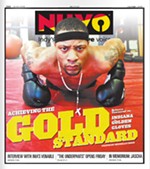Jon Wilkman Talks About His PBS Doc 'Chicano Rock'
Most of the country thinks of Los Angeles as Hollywood, the beach, Disneyland and the Lakers. But as filmmaker Jon Wilkman will tell you, there's far more to the nation's second-largest city than that.
"To understand Los Angeles," he says in a telephone interview, "is to begin to understand the country as it grew and as it's going to become."
Wilkman's effort to add to our understanding is Chicano Rock! The Sounds of East Los Angeles, his hourlong documentary that traces the musical evolution of the Mexican-American community that rides down Whittier Boulevard.
He more or less breaks the story down into three eras: early artists such as Lalo Guerrero and Don Tosti, who infused jazz, swing and pop with Spanish inflections; rock 'n' rollers such as Ritchie Valens and Cannibal and the Headhunters, whose Mexican heritage was mostly incidental to their music; and groups such as Thee Midniters and, later, Los Lobos, who bridged and embraced both cultures.
Valens' story was told in the 1987 film La Bamba, starring Lou Diamond Phillips, and he's immortalized as part of the 1959 "Day the Music Died" plane crash that also killed Buddy Holly and The Big Bopper. The others' stories are less well known but no less interesting.
Cannibal and the Headhunters (who even knew they were Latino?), for example, were the opening act on The Beatles' 1965 American tour thanks to the Fab Four's fondness for their hit song "Land of a Thousand Dances." Wilkman couldn't find footage of Cannibal's appearances on that tour -- much to his dismay -- but he does provide images of them posing with John, Paul, George and Ringo. Thee Midniters recorded the de facto anthem for East L.A. Chicano rockers, "Whittier Blvd.," and served as the inspiration for Los Lobos, one of America's all-time greatest bands.
"I'm not a Latino," Wilkman says. "But what gives me the most satisfaction is when I can be the vehicle for these stories and these voices. And that's what I try to do in the film as much as possible -- to let the people who did it tell the story and give them an opportunity to reach out to an audience via the filmmaking I do."
Wilkman, 66, spent eight years working on this project and securing the financing needed to finish. (Latino Public Broadcasting, the California Council for the Humanities and the Skirball Foundation ultimately came through.)
Convincing people the story had resonance beyond Los Angeles took some doing, Wilkman says. But to him, this little-known story of Los Angeles' Mexican-American community assimilating through music is as relevant as the stories of Chicago in the 1920s, the Harlem Renaissance and immigrants inhabiting New York's Lower East Side.
He wants viewers to understand America's largest Mexican-American community and the changes it went through culturally, socially and politically. By doing so, he says, they'll recognize the changes happening now in the United States.
"We are, like Chicano musicians, beginning to blend cultures, just like they blended musical sounds," Wilkman says. "It's not only a story about the past; it's suggesting what our future is going to be -- not only musically but culturally."
Or as Los Lobos drummer Louis Perez says toward the end of the film: "Over the course of 20 years we've been on the road, we've seen the whole face of America change -- and that face is brown. Because we're everywhere now."
Chicano Rock! The Sounds of East Los Angeles
9 p.m. Sunday (Dec. 14)
PBS






